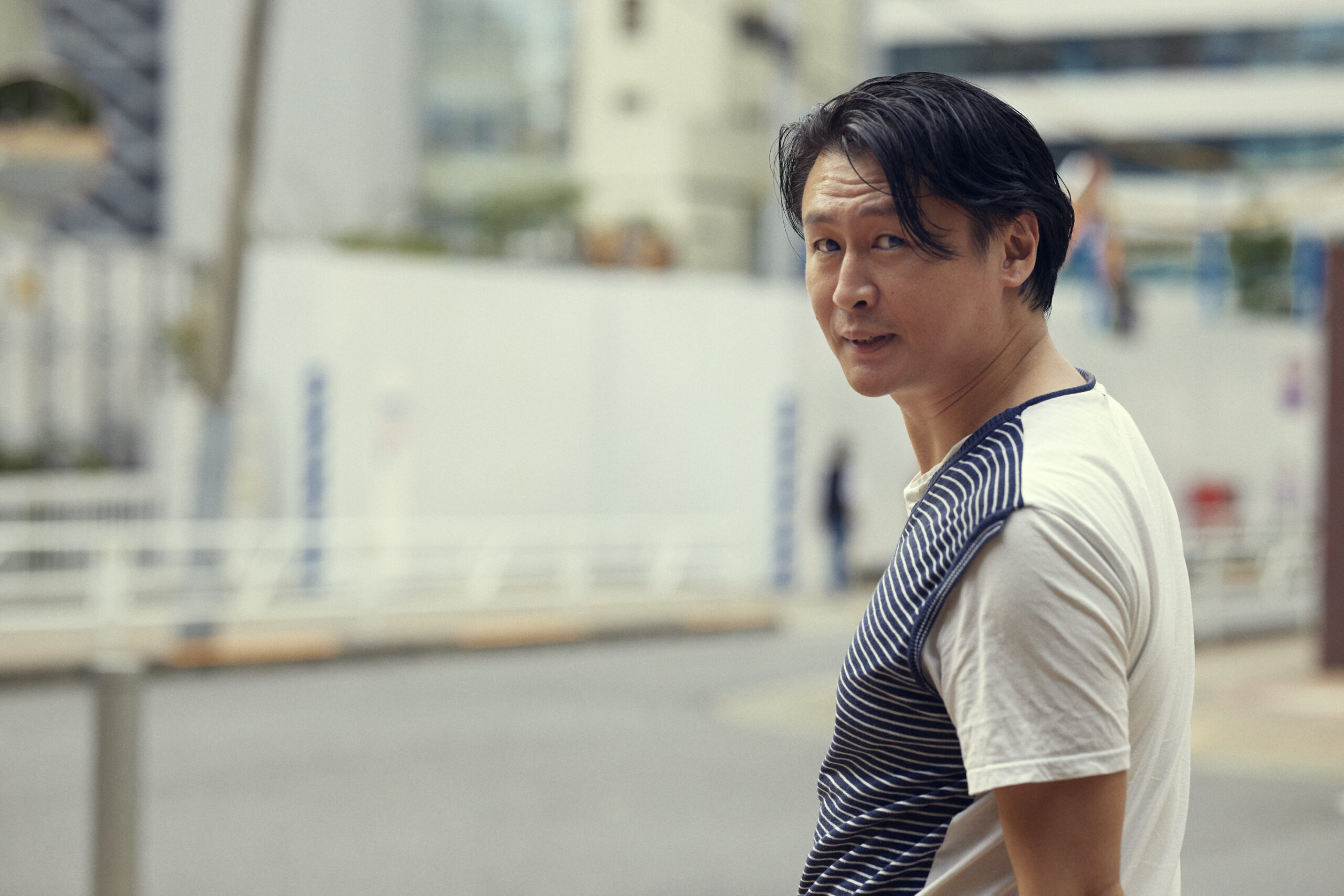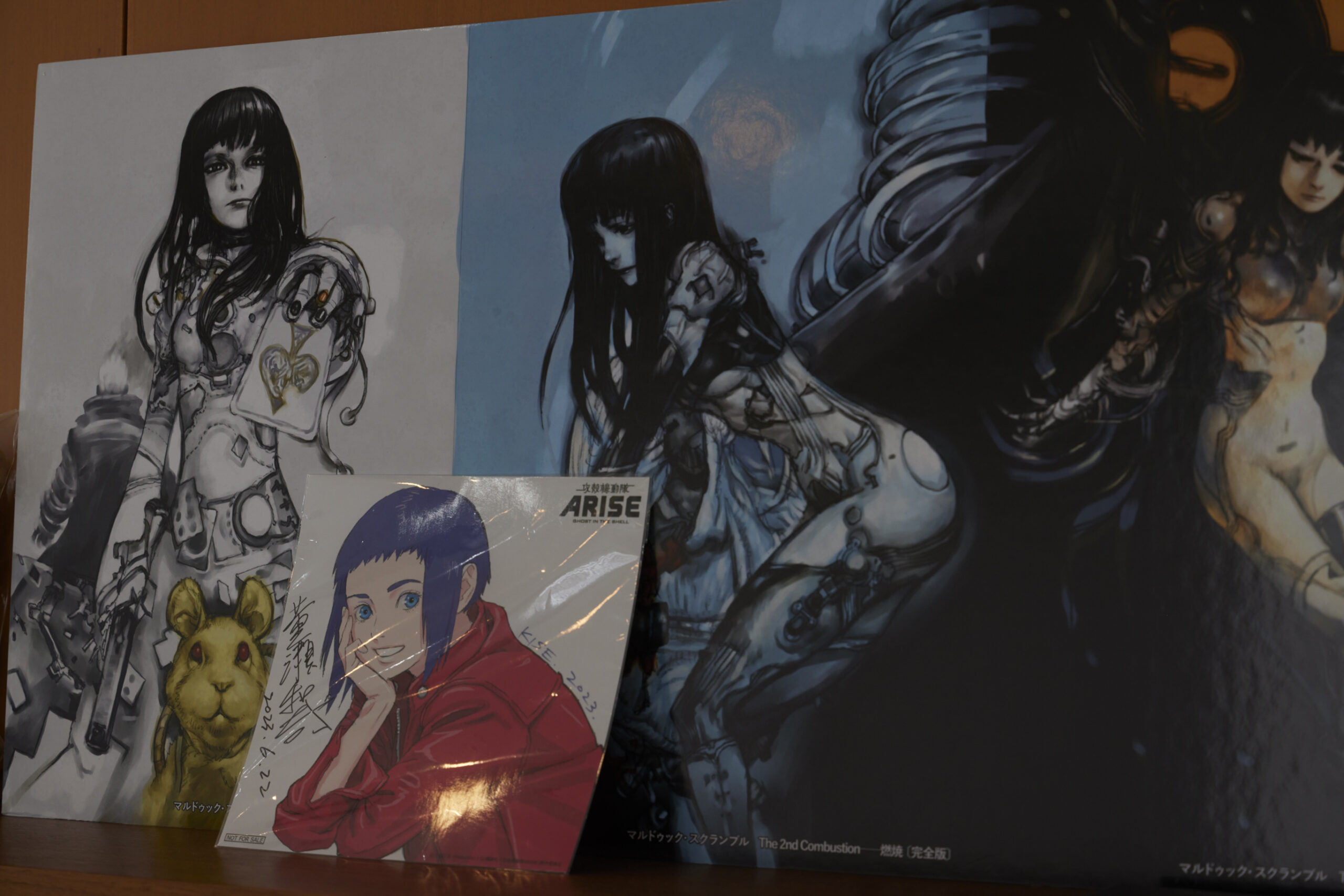
The Questions of “Ghost in the Shell” as Presented by Tow Ubukata: Behind the scenes stories of the origins of “Ghost in the Shell: Arise” and the future of the series #03
Text: Miho Otobe / Photo: Eiji HikosakaThe miniseries Ghost in the Shell: Arise (2013-2014) took on a new challenge with a serial structure utilizing four directors for separate theatrical releases. Meanwhile, one man, Tow Ubukata, worked on the scripts for all of these works. Ubukata has been a series fan since the release of the first manga. While working as a writer on Arise, the internet had reached ubiquity in modern society, leaving a distinct set of struggles in depicting a future society. In this interview, we asked about that, as well as his efforts to preserve the Ghost in the Shell series for future generations and the future he envisioned for it.
#03 AI and Drones as Challenges for "Ghost in the Shell"
―The episode “border:1” of Ghost in the Shell: Arise is set in 2027. That’s just three years from now.Is our society now different from what you envisioned when you wrote the series?
Tow Ubukata(“Ubukata”): The coronavirus pandemic caught the whole world off-guard, me included. Another unexpected point was that humanity went to war even in the middle of pandemic chaos. Part of the backstory of Ghost in the Shell is about war-spurring cyborg development, and it’s honestly terrifying to see that on the verge of becoming reality. Wars generate horrifying numbers of wounded soldiers, so there will be a lot of them with cybernetic hands and legs for prosthetics in the near future, I suspect.And robots and cyborgs aside, I honestly never expected drones to evolve as they have, either. Drones were just simple radio-controlled toys, and now they’ve been weaponized to such an extent that they influence the course of battles.

―AI is now an accepted part of our daily lives. How did you think about portraying it in your work?
Ubukata: I feel like it will be a real struggle to depict AI in entertainment in the future. For example, AI can even give rise to accidents and bias depending on the traits of the people programming it. There was a case in the US where an AI facial recognition system was unable to recognize Black women properly, and someone got misidentified and arrested by the police. And the fact that many AI programmers are white men is relevant to the issue. Basically, the AI learned prejudice and learned to encourage racism. If we can’t resolve that sort of issue, it makes it hard to depict AI in entertainment, but it does present a definite theme for the future. I feel like AI and drones are big themes Ghost in the Shell has to tackle over the next decade.
―What are your thoughts on AI issues? And how do you see them relating to Ghost in the Shell?
Ubukata: They say AI is dual use, as in it has both military and civilian applications and can both benefit humanity and pose a major threat to us. One overseas researcher looked into using AI to create hazardous substances. They found that it produced over 50,000 chemical formulas for toxins overnight, and they hurriedly put a stop to the experiment. If we leave it to AI, it really will do anything. Weapons and war would be the same; we could even have AI develop unmanned weapons in the name of a good cause by limiting friendly casualties.And since AI regulations still aren’t set, a major company or powerful group could force misuse for their own benefit. It’s allowed as a dual-use technology, even with the potential to pose a threat to humanity if major corporations grow to where they can almost break down the structures of nations. And the world might develop that way.
I’d like to look back to the first page of the original work, where there is a very famous preface, saying, “In the near future, corporate networks will reach out to the stars. Electrons and light flow throughout the universe. The advance of computerization, however, has not yet wiped out nations and ethnic groups.” I wonder if maybe corporate structures will be a theme in the next Ghost in the Shell, with AI connected to that fundamentally.

―How do you want to see the series mature in the future from here?
Ubukata: I’d love to see someone make a “next team” for it. Like how the US TV show CSI: Crime Scene Investigation had the spinoffs CSI: Las Vegas and CSI: New York, and then CSI: Vegas after that, with a shifting cast but the same broad themes. I think that structuring Ghost in the Shell that way would open it up to expanding. You could depict a new team while keeping familiar characters frequently present and cover modern technologies while incorporating new touches. It sounds like a fun project to me.
―How do you see Motoko?
Ubukata: This might be exaggerating a bit, but to me, Motoko is a Christ figure. She’s punished and dies, only to rise again and spread worldwide. That’s exactly like Christ. Looking back on it now, I feel like I was inspired personally by the resurrection of Christ for my depiction of Motoko. I look forward to seeing what comes next for Ghost in the Shell and whether it will give rise to another character to carry on its setting and the cyberpunk themes of humanity and freedom in a cybernetic world in Motoko’s place.
―You definitely still have lots of creative ideas. If you got another offer to write for Ghost in the Shell, would you take it?
Ubukata: No way! *Laughter* Seriously, it’s a lot of work. It took about three years from first being approached for planning to finishing writing for Ghost in the Shell: Arise. The job takes a lot of focus, and it’s not easy to write anything else while working on it. And what’s more, you usually can’t bill for an anime script until the final version is accepted. You can end up without an income for a while if it takes time, so it can be a life-or-death issue. My kids are in school now, so for a while, that kind of project is a hobby I’m holding off on until they’re fully grown. *Laughter*

(END)
TOW UBUKATA
Born in Gifu Prefecture in 1977. He made his authorial debut as a student at Waseda University in 1996. He won the Eiji Yoshikawa Prize for New Writers, the Honya Taisho Booksellers’ Award, and more for Tenchi: The Samurai Astronomer. Nominated for the Naoki Sanjugo Prize for the same title, as well as works including 12 Suicidal Teens and Koppai. He is also an active anime series showrunner and scriptwriter, with credits including the Fafner in the Azure and Psycho-Pass series.

